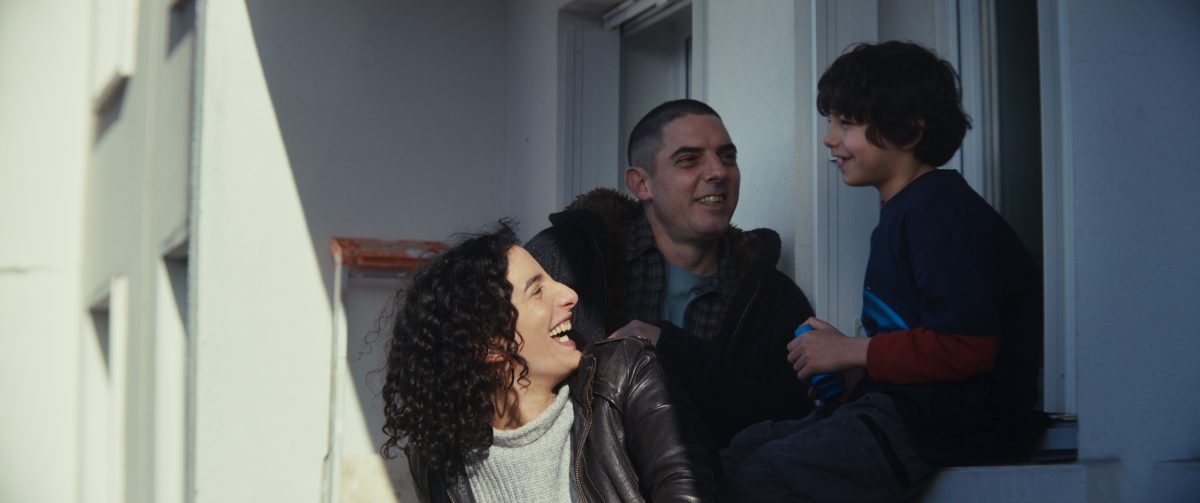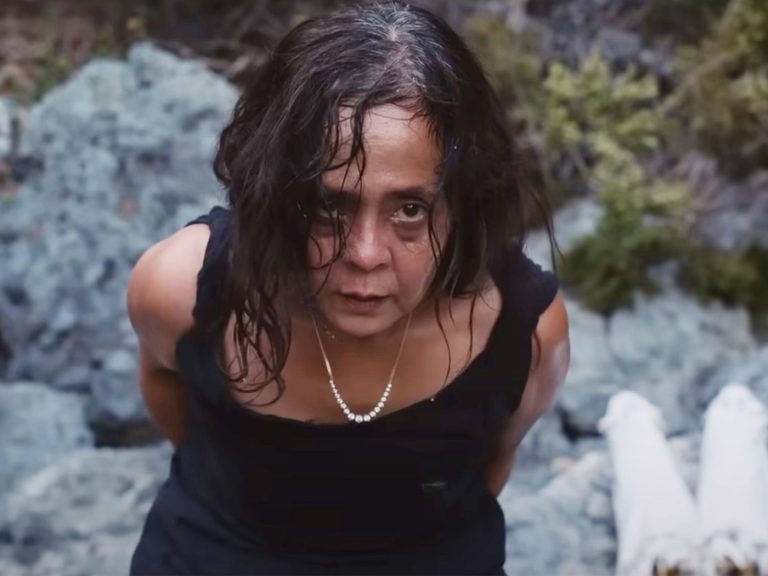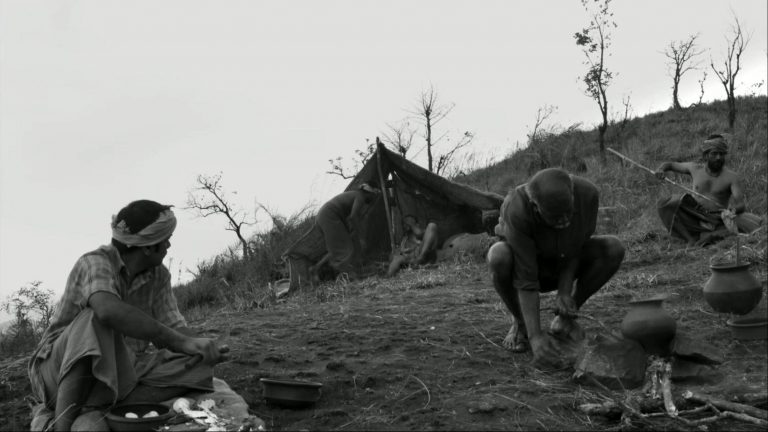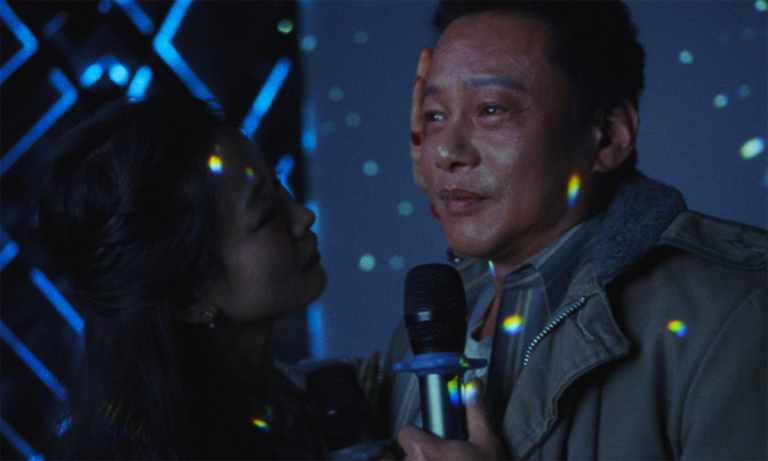The great Damien Bonnard doesn’t need a convincing, fully fleshed-out story to display his prowess. Through layers of ambiguity and deliberate obfuscation, Bonnard reaches out, carving a deeply enmeshed character in Akihiro Hata’s Orizzonti-premiering “Grand Ciel” (“The Site,” 2025). Much of Bonnard’s character, a worker at a construction site, stays hidden in the recesses, his ulterior schemes constantly at work but tucked out of sight. Vincent is diligent and meticulous, hopeful that his unwavering, unrelenting work will propel a position of rise. But of course, that doesn’t pan out as neatly.
Even as he plods at a site which ostensibly props itself up as among a pioneering, ‘smart’ neighbourhood replete with futuristic mobility and access, his and other workers’ places remain tenuous. While the site keeps rising and billowing out, workers’ security is kept on the anvil. There’s no assurance for them. Promises aren’t met, the transitory nature of employment, forever at stake of dismissal, grinds into the marrow of a communal connectedness. Individual interests threaten to take full and primary precedence, waiving away any sympathy and consternation for the other.
Suddenly, ASR concerns mushroom in the tunnels of the site. Cracks show up. Then, workers begin to disappear. Vincent is initially shaken. He senses something awry in the words and deeds of the boss, the goings-on at the place. The management tries to hush them up, set them against each other, using Vincent as their plaything. He’s provoked to act, a sentiment shared and prodded among his co-workers. Unease builds with undeniable, insistent force. The workers debate baulking and lashing out in a demand for accountability. If one of them disappears, should the rest even pretend not to be affected? How long till danger descends upon them all and takes more of them captive?
A Must-Watch: 10 Best Films Dealing with Toxic Work Culture
Divisive lines are magnified among the workers. There are very sharp delineations among them on how to proceed with the situation. Shouldn’t they resist? Wouldn’t steady, mute compliance invoke greater threat in days to come? Vincent feels the impetus of mobilisation gather all around him. Bonnard’s performance doesn’t instantly give away the principles governing his response to the crisis. But you can intuit how deep and gnawing the job insecurity burrows. When one’s livelihood might get pushed to stake as a consequence of resistance, would you flinch and retreat or keep fighting? Morality and conscience go for a toss, and Vincent struggles with the blow.

More Related to the Subject: The 15 Best Movies About the Working Class
He is torn and seduced by the space for his own agenda, the crisis incites. The frightful, knotty quandary with its gaping, unnerving implications gets weaponised instead to serve Vincent’s career-centred advances. The community of his co-workers, a general, over-arching sense of workplace safety, turned secondary, sacrificed at the crucible of hidden personal ambition. As more people get shunted, his ingress into a leadership position smoothens out. Now, he can do a lot, command others, which wasn’t possible earlier. The disappearances are redirected into his convenience. That’s how he capitalises on a tough, bleak, snowballing series of circumstances. The significance of others’ needs and anxieties diminishes. Neither does he gel with the others.
Bonnard does well to establish a sense of moral equivocation, with Vincent quietly slithering into securing and expanding his own corner. Vincent cannot afford to cede his designs and intelligence. He must have a cautious, deliberate plotting which won’t collapse under the weight of mounting suspicion. Hata summons the undercurrents, the abiding tension of Vincent’s motives being brutally unravelled with a considered hand. Equally effective is the ominousness, the foreboding drenching the underground spaces. They become a place of terror waiting in the wings. Vincent’s fear of the unknown is eclipsed by the absolute exertion of self-preservation.
Even as his wife lands a job that lures a better, well-padded life, working-class instability is never too far behind in reasserting its unshakable place. Hata fleshes intrigue and suspense in the cavernous, dark depths Vincent and his team hammer through. Secrets seem to hiss from each corner that evades the eye, yet tantalises. “Grand Ceil” juxtaposes these with the subterranean parts of Vincent’s self. Together, the two form a bracing, unnerving association. Survival being a cut-throat race chips away at humane impulses, pushing Vincent into taking on a mute, lethal edge. Overall, “Grand Ciel” is fuelled by a kind of nihilistic force that keeps booming on long after the credits roll.




![Something in the Water: A Kinston Basketball Story [2020] Review – Glories of the past, present and future](https://79468c92.delivery.rocketcdn.me/wp-content/uploads/2021/01/Something-in-the-Water-2020-highonfilms-1-768x404.jpeg)
![The Trials of Gabriel Fernandez [2020] Netflix Review – A Shocking Case of Child Abuse, Murder and Institutional Negligence](https://79468c92.delivery.rocketcdn.me/wp-content/uploads/2020/03/The-Trials-of-Gabriel-Fernandez-2020-768x432.jpg)
![Finding Neverland [2004] Review: An Underrated Gem of Cinema](https://79468c92.delivery.rocketcdn.me/wp-content/uploads/2019/05/fn1-768x326.jpg)

